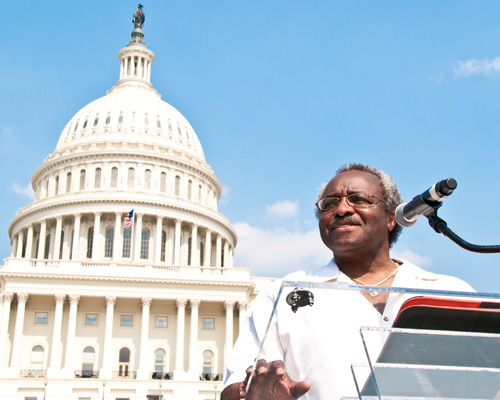The F.B.I. and D.C. Statehood
 The Federal Bureau of Investigation proposes to relocate from the District of Columbia into nearby Virginia or Maryland. For reasons outlined in this Article, that move should not be allowed unless Washington, D.C. is accorded statehood status.
The Federal Bureau of Investigation proposes to relocate from the District of Columbia into nearby Virginia or Maryland. For reasons outlined in this Article, that move should not be allowed unless Washington, D.C. is accorded statehood status.
Every human being on this planet, residing in a nation with a representative government, enjoys political standing and sovereignty, except those who happen to reside in Washington, D.C. Political standing in America grows out of the Seventeenth Amendment, providing for the popular election of senators; as well as from Article I of the Constitution. The absence of equal representation for the people of Washington, D.C. in the United States Senate and our cloistered presence in the House of Representatives contradicts the essence of American democracy, runs counter to international law and custom and puts America in breach of international treaties to which it is a party. More pointedly, the absence puts America in breach of its covenant with the people of Washington, D.C. every time it moves a federal facility outside of the District of Columbia. This writer believes that so long as the residents of Washington, D.C. remain without political standing and sovereignty 1) the United States is in violation of international law; 2) the United States is forbidden from moving any federal facility from the District of Columbia; and 3) the United States is required to return to the District of Columbia any federal facility currently lodged outside of the District of Columbia. Thus, the United States should be prohibited from carrying out its current plan to move the Federal Bureau of Investigation outside of the District of Columbia and the Congress should be mandated to take the necessary steps to comply with the language of treaties to which the United States is a Party. Moreover, residents of the District of Columbia have been damaged by revenue foregone as a result of these violations and breaches over the years in amounts that reach into the billions.
Breach of Compact
When citizens have the benefit of political standing and sovereignty, as every American has, except those residing in Washington, D.C., they are said to be on equal footing. When crafting the form of our government, the Founders created a system that would protect these rights. Instead of James Madison's vision of a national government free from the influence of the states, the final version of the Constitution granted the states a substantial role and basic involvement in the operation of the national government. As the United States Supreme Court has noted, the Constitution divides authority between federal and state governments for the protection of individuals. That is why statehood for the District must be the ultimate goal. Only statehood can provide the protection of individual rights that the Constitution demands.
By an Act of Congress, 16 July 1790, the current Potomac site was selected as the District “not exceeding ten miles square” for the permanent seat of the government of the United States. On 11 November 1800, the District of Columbia was created, from land ceded by the states of Maryland and Virginia, and the residents of the District of Columbia cast their last ballots in national congressional elections. By the end of the following February, the Organic Act of 1801 was signed into law. The implications of the Organic Act had the dual effect of robbing District residents of the sovereignty they enjoyed as citizens of Maryland and Virginia prior to the Act’s passage, and also of their ability to vote in both federal and state elections.
Yet, according to considerable legislative history, the residents of the new Capital acquiesced to the burden of losing their rights for the expected benefit from federal patronage. The District was to become the home of all federal buildings and quickly emerge as a bustling center of commerce. The economic benefit of federal patronage would be passed on to all residents of the District and amply compensate them for the loss of their political rights.
However, those who resided on land ceded by Virginia did not experience the expected benefit - there was no Pentagon or Central Intelligence Agency placed in Virginia at the time - and successfully petitioned Congress in 1846 to remove that part of land from the District of Columbia. Congress did so by statute, a simple act. Federal headquarters facilities remained in the District of Columbia until 1938 when the National Institutes of Health was moved to Bethesda, Maryland, followed by the Pentagon, the Central Intelligence Agency and others. By moving these federal headquarters agencies outside the District, the federal government breached its compact with the residents of the District of Columbia.
Violations of International Law
Treaties to which the United States is a Party have a force equal to that of Congressional statute under the Supremacy Clause of the United States Constitution, which states:
“This Constitution, and the Laws of the United States which shall be made in Pursuance thereof; and all Treaties made, or which shall be made under the Authority of the United States, shall be the supreme Law of the Land; and the Judges in every State shall be bound thereby, any Thing in the Constitution or Laws of any State to the Contrary notwithstanding.”
The United States is a Party to a number of treaties and other agreements that clearly and unequivocally establish an international obligation on the part of their signatories to uphold the principles of sovereignty and political standing. The International Bill of Human Rights is the most comprehensive enumeration of those political rights, and speaks directly to the specific rights denied to residents of Washington, D.C. The International Bill of Human Rights consists of several components, including the United Nations Universal Declaration of Human Rights (The Declaration), the International Covenant on Civil and Political Rights (the ICCPR), the International Covenant on Economic, Social, and Cultural Rights (the ICESC), and two optional protocols to the ICCPR. The Declaration and the ICCPR both explicitly support the case for statehood for the District. The Declaration states, “Everyone has the right to take part in the government of his country, directly or through freely chosen representatives.” Virtually every country has joined the 48 original members in supporting the Declaration, with many incorporating its language into their national constitutions. Similarly, the International Covenant on Civil and Political Rights (ICCPR) provides that, “All peoples have the right to self-determination. By virtue of that right they freely determine their political status and freely pursue their economic, social, and cultural development.” The United States is among the countries to have ratified the Treaty.
The United States is also a party to several regional instruments that further emphasize its obligation to promote full voting representation for every citizen. In 2003, the Inter-American Commission on Human Rights, an organ of the OAS, ruled that the United States,
“ … has failed to justify the denial to the [residents of the District of Columbia] of effective representation in their federal government, and consequently that [they] have been denied an effective right to participate in their government, directly or through freely chosen representatives and in general conditions of equality, contrary to Articles XX and II of the American Declaration.”
Every state in the world that holds elections for a national legislature grants the citizens of its capital full voting rights and representation. The United States is the sole exception. Six foreign capitals, Canberra, Australia; Brasilia, Brazil; New Delhi, India; Mexico City, Mexico; and Caracas, Venezuela were all initially conceived of as federal districts mirroring the American model. All six have since attained full voting representation in their national legislatures. The United States has failed to uphold its binding commitments to its fellow nations and to the citizens of the District of Columbia.
Equal Footing for the people of Washington, D.C.
The federal government, through the words and deeds of those with authority, made a durable promise of sustained economic benefit to the residents of the District of Columbia in exchange for the surrendering of their sovereignty and political standing. The authorized representatives of the state of Maryland assented to the offer and the people of what is now the District of Columbia acquiesced on the strength of the federal government’s promise. There was thus a clear, bargained-for exchange of promises when the District was created. The federal government and the Founding Fathers promised that the District would enjoy federal patronage and the special economic benefit of that patronage. In exchange, District residents agreed to sacrifice the key privileges of state citizenship, including sovereignty and political standing.
Beginning in 1938 and continuing since that time, the federal government began moving federal agency headquarters outside the District of Columbia and by so doing, the federal government is in ongoing breach of its compact with the residents of the District of Columbia. While District residences have fulfilled and continue to fulfill their end of the bargain for exchange, suffering through over two hundred years without sovereignty and political standing, the federal government has unilaterally failed and refused to maintain its part of the Compact. That failure and refusal constitutes a breach that can only be remedied by returning all federal agency headquarters to the District of Columbia or restoring sovereignty and political standing to the residents of the District.
In addition, the United States through its acts or omissions is in violation of several international treaties and laws. These violations have been done under color of law. D.C. residents have been harmed as a consequence of these violations and these violations are the legal cause of this harm. It cannot be stated with absolute accuracy the amount of the harm to Plaintiffs, however the amount is considerable. If Statehood status is granted, the ongoing injury to the people of Washington, D.C. will be eliminated.






